8 Real-World Examples Why You Should Stop Googling Symptoms
Some people can attest to why looking up possible health conditions is a bad idea. Here are eight real-world examples of why you need to stop Googling your symptoms.

The next time you’re experiencing an unusual health symptom, chances are you’ll look up what it means on Google before visiting the doctor.
If you’re looking for “Dr. Google” to answer questions about your health, you’re not alone. 33% of Americans search the symptoms they’re experiencing before seeking a health professional.
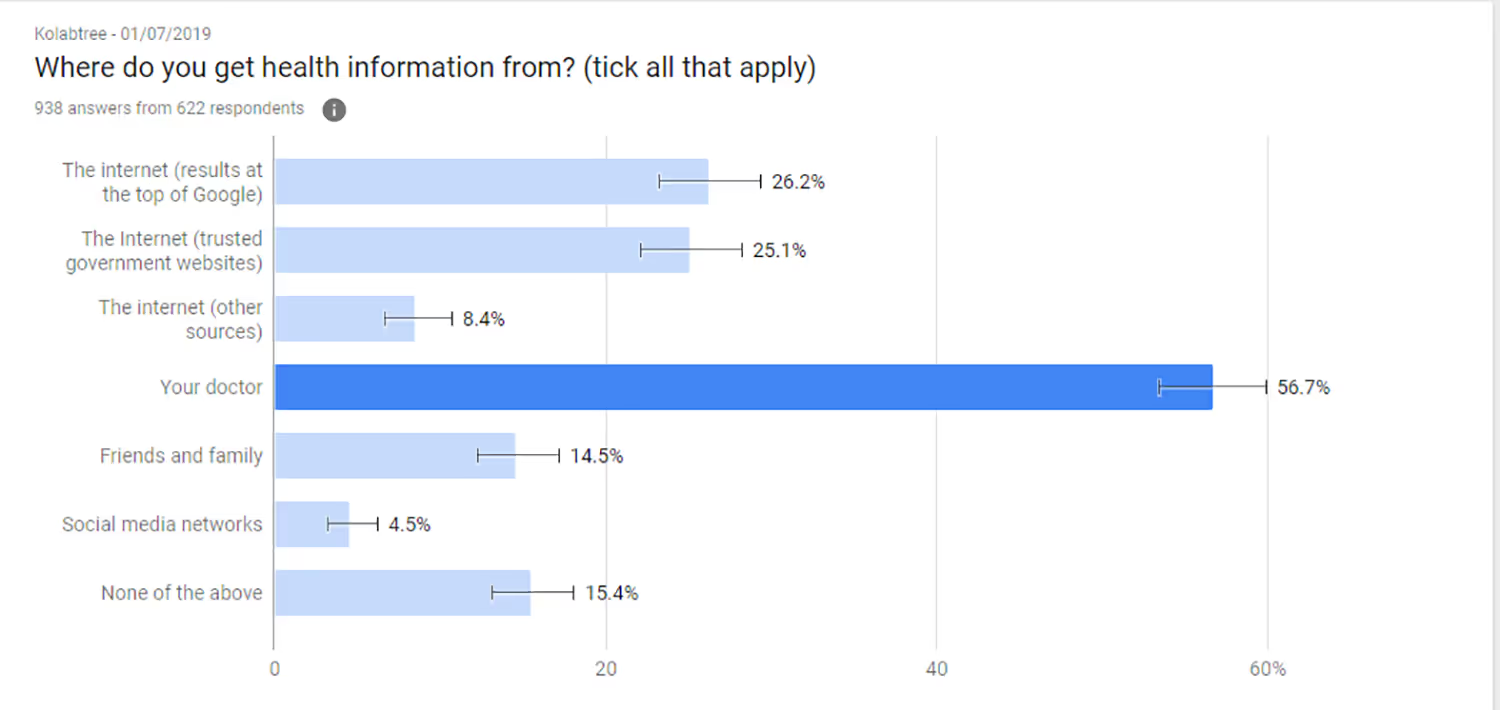
Sure, this might be more convenient than scheduling a doctor’s appointment. Looking up health information isn’t all that difficult. Especially with search algorithms in place to provide instant results.
Sometimes we do this because we’re hoping for peace of mind that what we’re experiencing is normal or not serious. If the results reassure us that it isn’t serious, we may skip the doctor even if we should be getting medical attention. After all, triage advice from symptom checkers isn't always accurate.
On the other hand (and the more likely scenario), the potential diagnosis is more serious than we would like to see. There’s a reason that there’s an ongoing joke that WebMD will always say you’re dying.
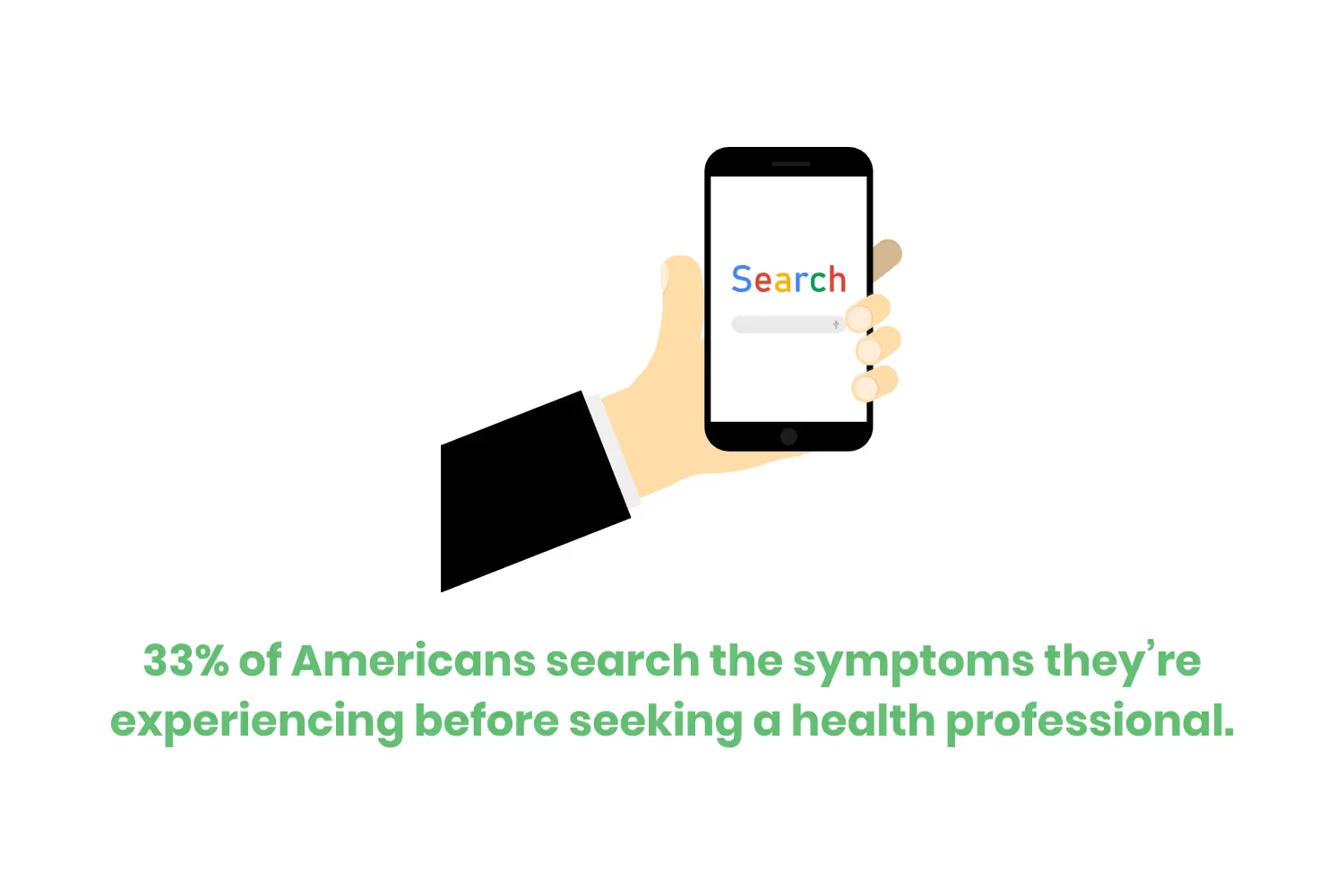
But these kinds of results could make people avoid the doctor because they don’t want to hear bad news. Or they’ll worry so much that it leads to other harmful consequences.
Two in five people end up diagnosing themselves with a serious disease after using Googling their symptoms. A survey of 2,000 Americans found that 43% of them had misdiagnosed themselves after searching their symptoms online. And 74% said that the results made them more worried.
Some people can attest to why looking up possible health conditions is a bad idea. Here are eight real-world examples of why you need to stop Googling your symptoms.
What Are the Risks of Googling Symptoms?
It’s easy to misinterpret health symptoms without the proper medical training. Two in five people end up diagnosing themselves with a serious disease after Googling their symptoms. A survey of 2,000 Americans found that 43% of them had misdiagnosed themselves after searching their symptoms online. And 74% said that the results made them more worried.
This obsessive online searching for health information which often leads to health anxiety and depression is known as cyberchondria. On top of seeking excessive reassurance from doctors, using symptom checkers online can lead these people down a destructive rabbit hole.
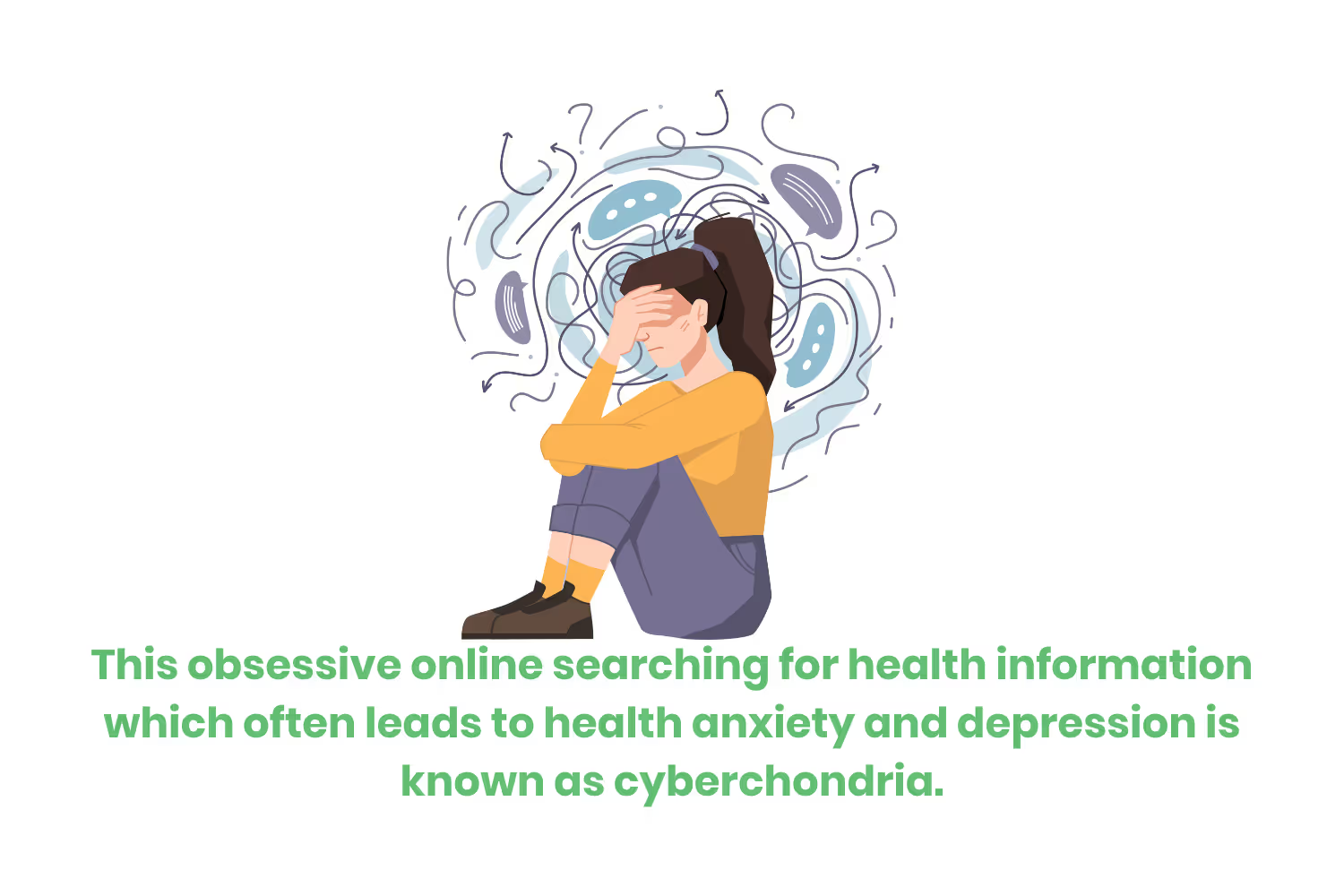
Misdiagnosis, health anxiety, and unnecessary trips to the ER are just a few of the risks when you turn to Dr. Google instead of a licensed physician. It’s important to stop Googling your symptoms as a primary source of healthcare advice. Especially for people with health anxiety.
Some people can attest to why looking up possible health conditions is a bad idea. Here are eight real-world examples of why you need to stop Googling your symptoms.
Search Engine Tumor Turmoil
An anonymous nurse recounted a story from a patient who incorrectly self-diagnosed. The woman had convinced herself that she had a brain tumor after first experiencing fatigue. She thought her tiredness resulted from having young children, a full-time job, and that she stayed up late.
But then she decided to Google a remedy for her exhaustion. This took her down an internet rabbit hole that suggested her fatigue was a silent brain mass. The next day she tried to schedule a visit with her doctor, but there was no availability until the next week.
In that week of waiting, she didn’t eat or sleep and she worried more. This would only make her issue of fatigue worse. The patient also kept Googling symptoms of brain tumors, further convincing herself that she had one.
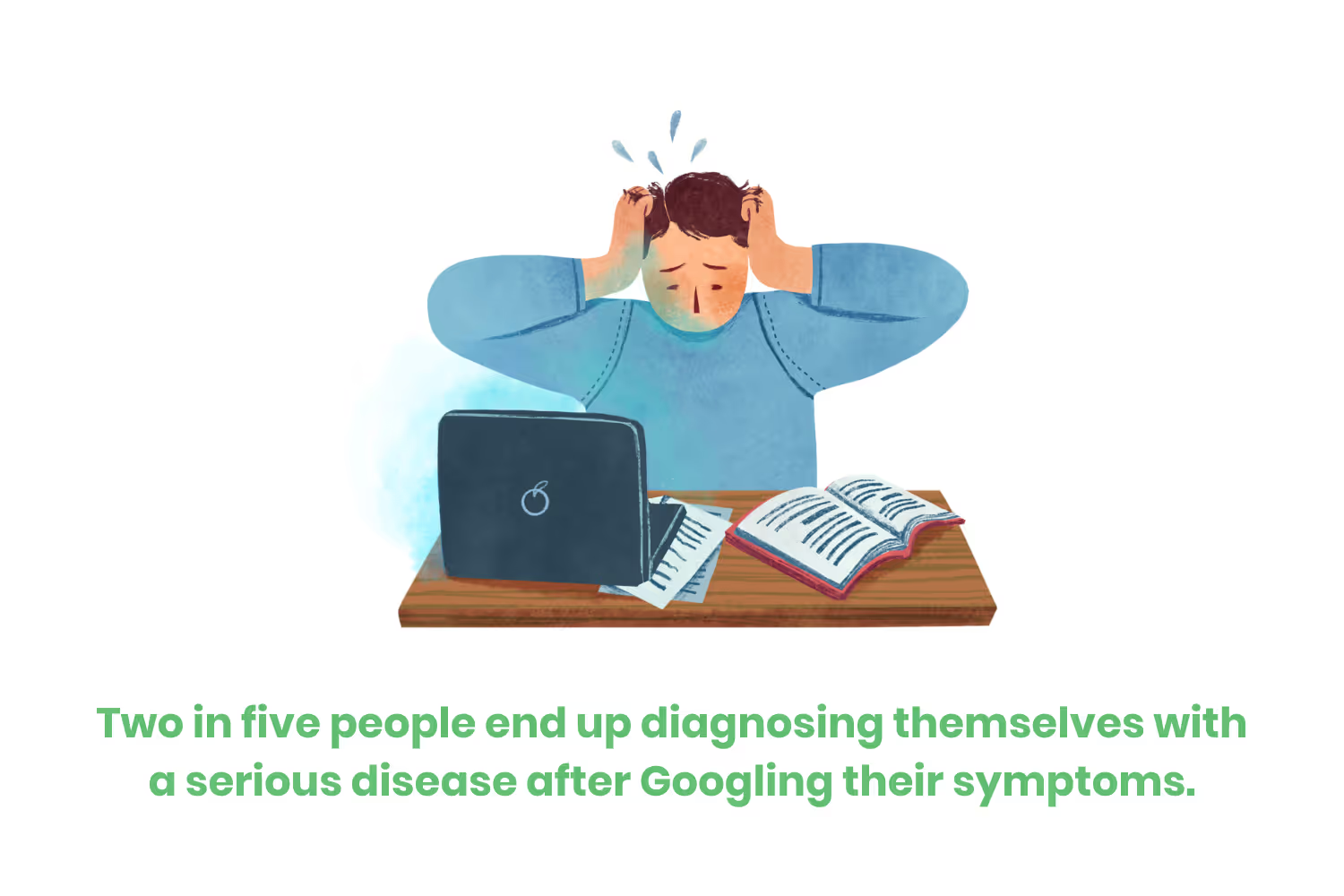
When she went in for her visit, she provided a list of all the scans and blood tests she wanted. The doctor advised against these because they were hasty and expensive decisions. But she had already convinced herself that she needed them, so they ordered the tests.
Unsurprising to the doctors and nurses, the patient didn’t have a brain tumor. Her blood work showed that she was slightly anemic, which they could have detected without so many expensive tests.
The woman caused so much extra stress over something that she could resolve with an iron supplement.
Liver Cancer Online Research
Debbie Kaufman started having a weird feeling in one spot of her stomach, so she went to an urgent-care clinic. They did an MRI test which showed several unexplained nodules on her liver. The doctor didn’t have an explanation from the MRI and said the spots could be benign or malignant.
She would then go to a specialist for further diagnosis. But between the visits, she made the mistake of Googling what was happening to her. The results of liver cancer told her that her situation could only be bad.
This led her to believe she was going to die and that she had to do things while she still had time. Debbie dedicated special days to spend with each of her children one-on-one.
The findings from the specialist were that the spots were benign, and Debbie didn’t have cancer. Her constant worry over the online misdiagnosis had wasted so much of her energy.
She now admits that she’ll stop Googling symptoms and instead go straight to the doctor.
Kidney Failure Self-Diagnosis (as Seen on TV)
If you’re the parent of a teenager, you might not be that surprised when you hear that they also look up their symptoms.
One teenager had seen a case of kidney failure on the show “House M.D.” The patient thought her kidney was palpable, so she Googled about the condition.
This convinced her that she was dying. When she went to the clinic, she feared she would die within a few hours because she believed she was suffering from the condition. But luckily for her health, the palpable area was just her love handles.
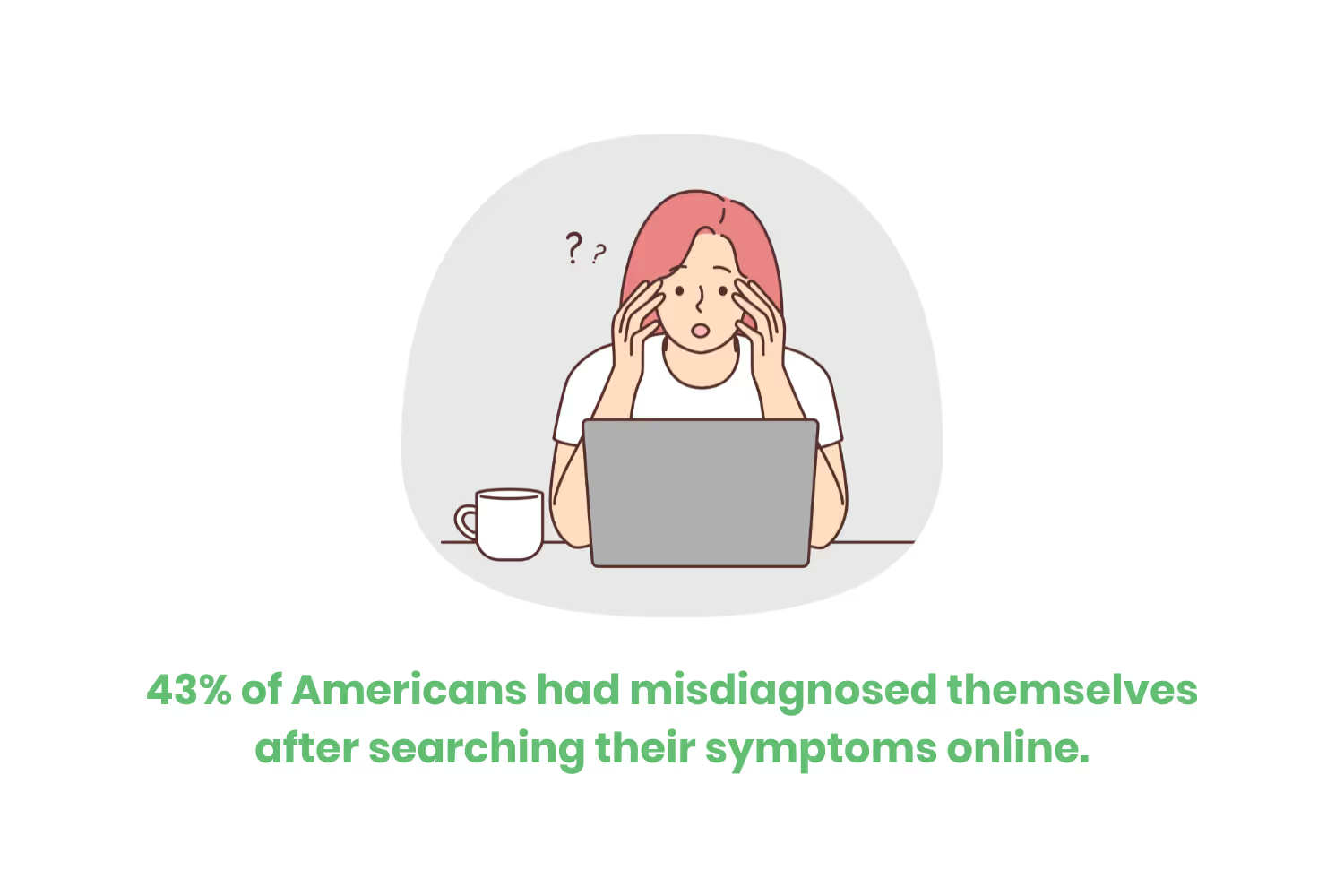
The One Time WebMD Doesn't Say Cancer
If you’ve ever used WebMD, then you know it’s not uncommon for cancer to end up as a potential cause for ailments. It’s as if any headache means a brain tumor or a new mole on your arm is skin cancer.
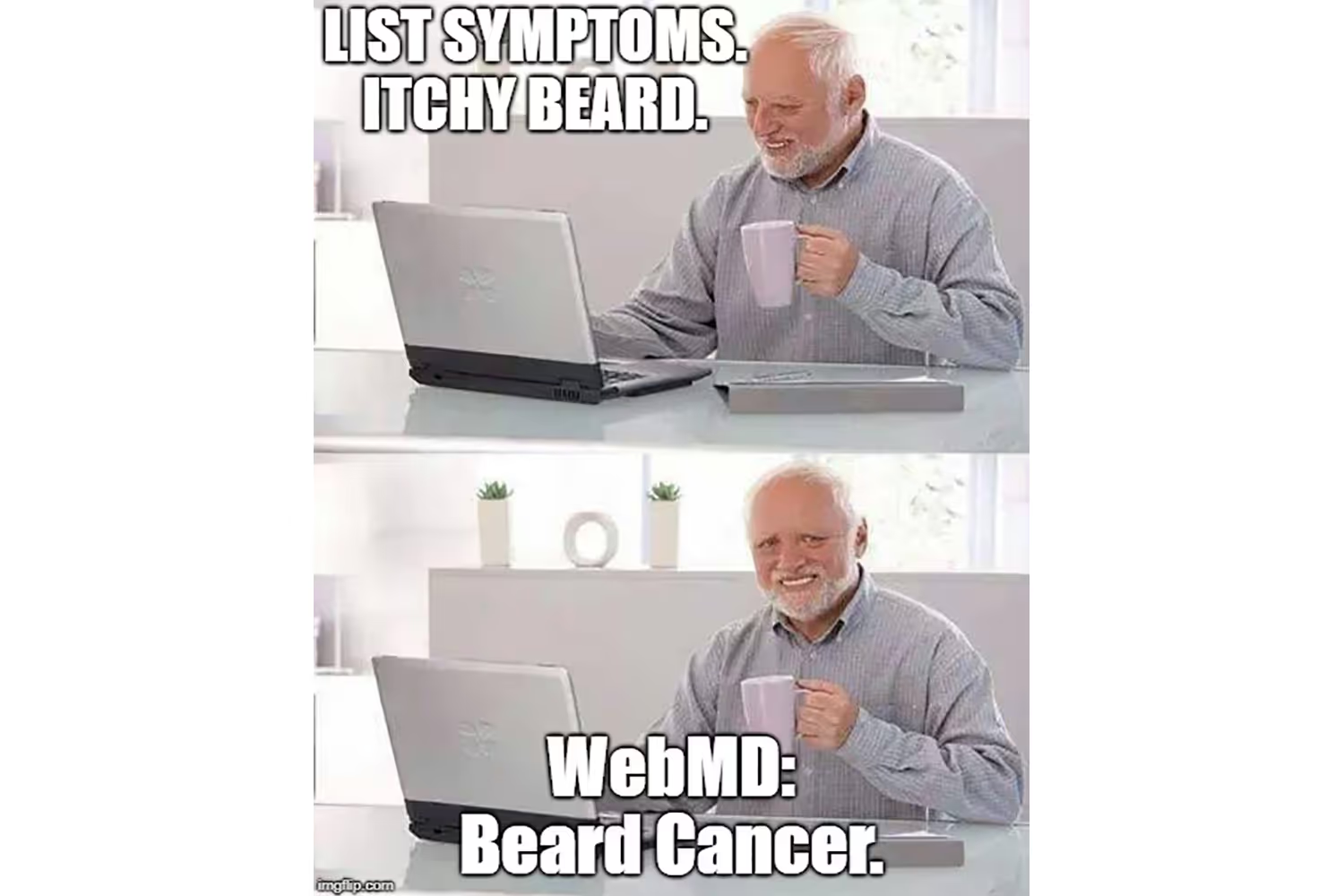
But for 23-year-old Amy Wheeler, this wasn’t the case. Cancer didn’t appear until far down the list when she plugged symptoms into WebMD. At first, she had a lump in her throat that could suggest thyroid complications.
She originally used WebMD to search for answers for this, but she had no other concerning symptoms. Even her doctor thought the lump was nothing when she went in for a prescription refill, so she brushed it off.
But then she started having other issues:
- Weight loss, despite eating more than usual
- Thinning hair
- Pounding heart
- Exhaustion
- Trouble sleeping
So she searched for an answer for these symptoms. WebMD suggested almost 100 possible conditions, including hyperthyroidism. Cancer was so far down the list that it didn’t seem possible, and thyroid cancer didn’t appear as a possibility at all.
Amy made an appointment, and her doctor agreed that she probably had hyperthyroidism. Even this doctor didn’t seem phased about the lump in her neck. But when the doctor checked Amy’s thyroid-stimulating hormone level, it was normal. All tests came back negative, except for a neck ultrasound and biopsy which indicated thyroid cancer: the one thing WebMD seemed to miss.
Thankfully, delaying a diagnosis because of the results that Amy originally found on WebMD didn’t harm her health. She only needed a simple surgery to cure her. But now when she’s concerned about a health problem, she first visits the doctor instead of Googling symptoms.
Trouble Breathing: Lung Cancer or Health Anxiety?
32-year-old Mark had lung pain which he immediately assumed was lung cancer. He says that it became an obsession, noting that he couldn’t think about anything else. He expected impending death, that he would be gone within three months.
He went to his general practitioner who was sure it wasn’t cancer, but this wasn’t enough for Mark. He returned several times, convincing the doctor that he needed hospital scans. Despite these medical expenses, the doctor gave in. Sure enough, the scans showed that it wasn’t cancer.
It eventually became clear to Mark that he was suffering from health anxiety, not lung cancer.
People with health anxiety need excessive reassurance from doctors. But even then they may still think they’re suffering from whatever condition they’ve convinced themselves that they have.
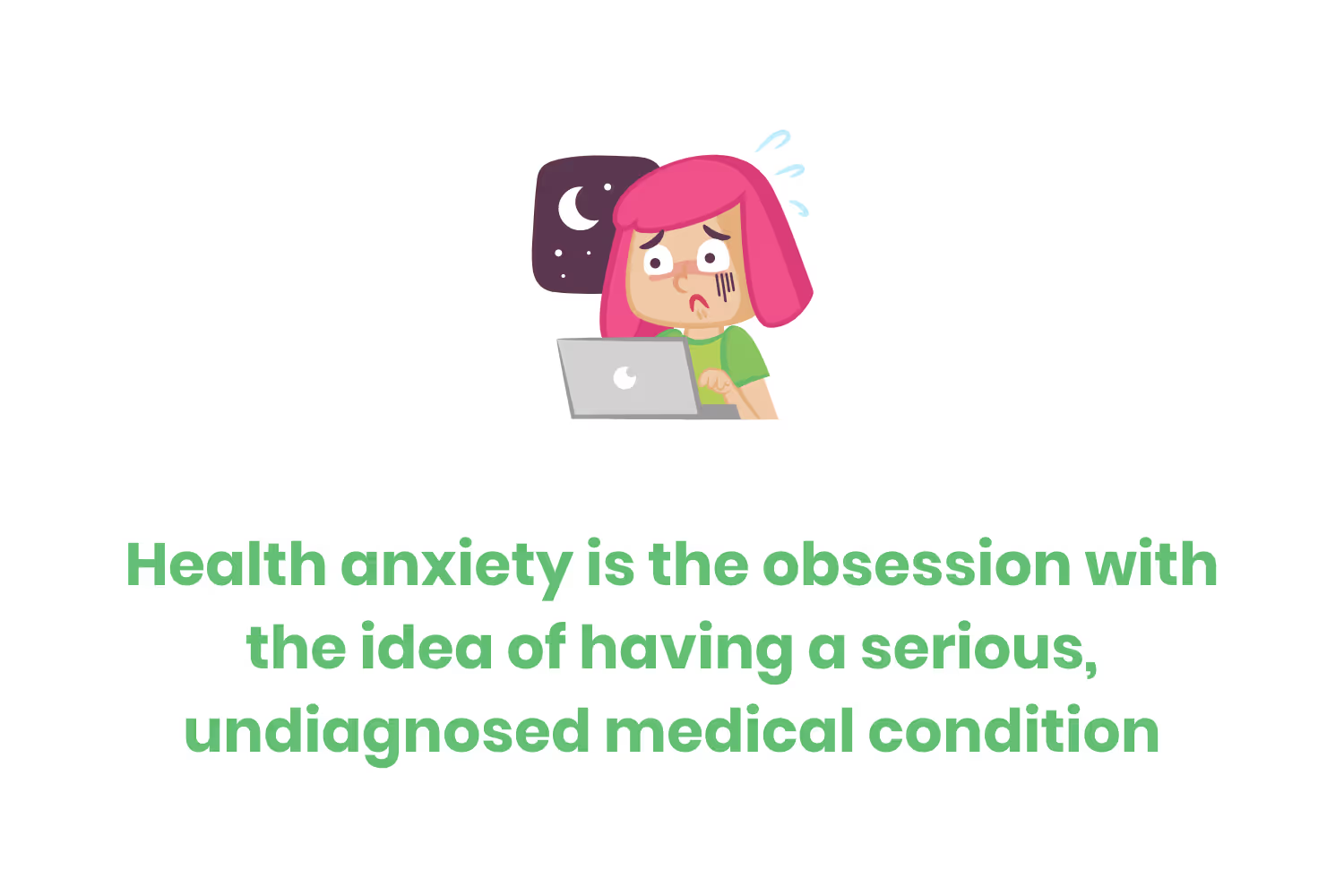
The internet plays a role in this because people become preoccupied with diseases and experiences they read about. They then assume that they have it, too.
Anthrax Attack or Hypochondria?
Soon after the attacks of 9/11, there was another terrorist attack on the US: the anthrax attacks, also known as Amerithrax. Letters laced with anthrax spores which caused serious infection started appearing in the mail. Five Americans died and 17 became sick from the biological attack.
After the 9/11 attack, it’s no surprise that this threat rattled the public. Helene Pavlov, M.D. recounts a self-diagnosis story from her friend.
He had a flight to New York on the same day the anthrax threat story broke and started feeling flu-like symptoms after his flight. When he got off the plane, he went online to read about anthrax and its symptoms.

This convinced him that he had the infection, so he went to the hospital. But when he got there, there was already a line of hundreds of people who had also convinced themselves they had anthrax. He decided not to wait in line and went home.
He ended up being anthrax-free and was fine, as most of the others who had waited at the hospital.
Tired of Symptom Checkers
Like the first story, a woman was struggling with fatigue for weeks. Instead of seeing the doctor, she turned to the internet.
Every site indicated a potential diagnosis: systemic exertion intolerance disease (chronic fatigue). She tried combatting this herself by ordering supplements that claimed to provide relief. Unfortunately, this didn’t work after she had already spent so much money and time trying to self-cure.
She visited her doctor who did a blood test. This revealed that she had anemia, easily treatable with the correct supplements.
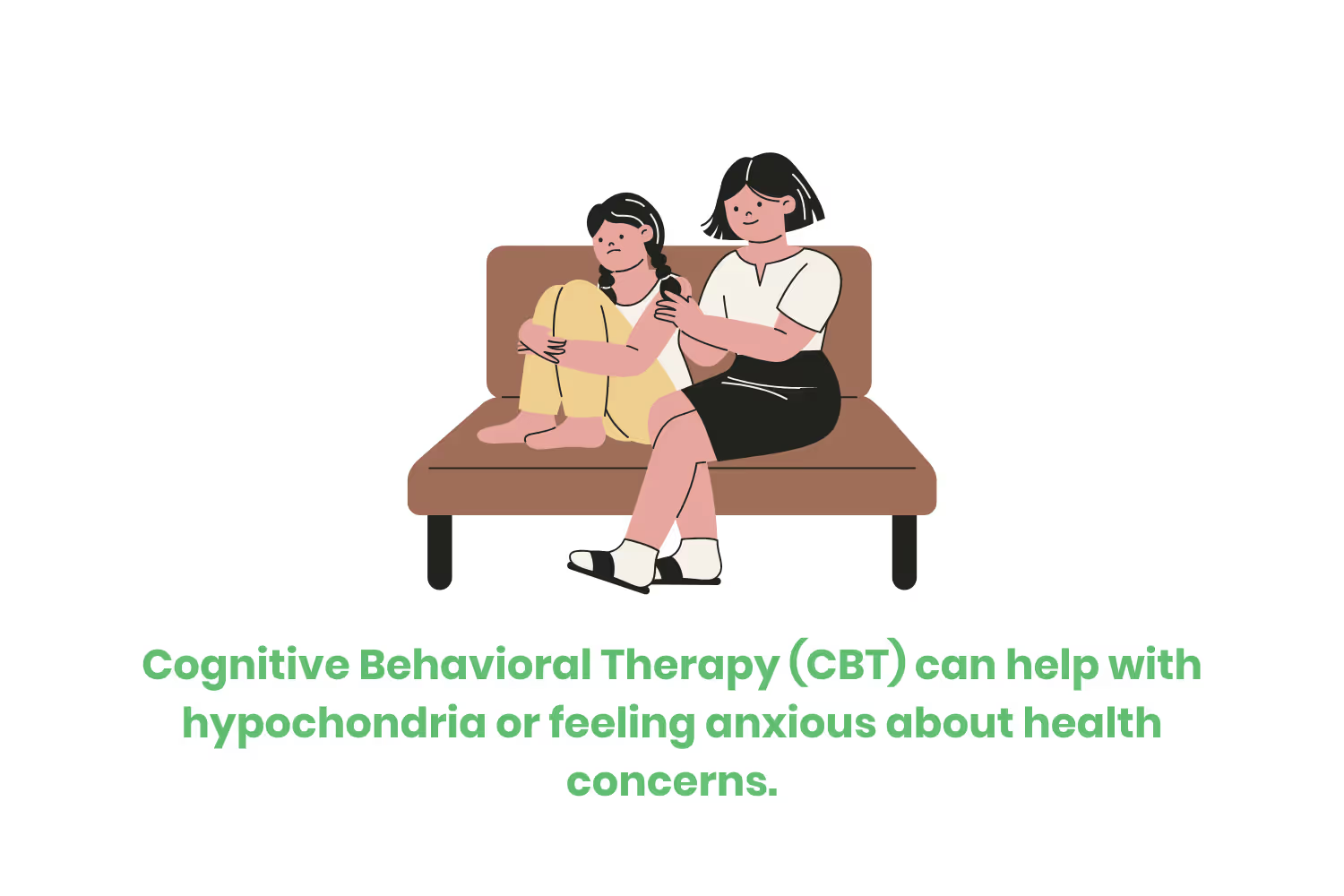
“I think I have that, too” (But it's Cyberchondria)
Even when you aren’t looking for health information, you may still happen to end up reading about it. A Facebook user saw a post that one of her friends had multiple sclerosis.
The user clicked a link that sent her to a message board of patients’ descriptions of early symptoms.
Some of these symptoms included tingling hands and feet. She knew she had those feelings before, so she set up an appointment with her doctor. The patient then demanded expensive and invasive tests, including a spinal tap.
But everything came back negative, and the patient had just been paranoid all along.
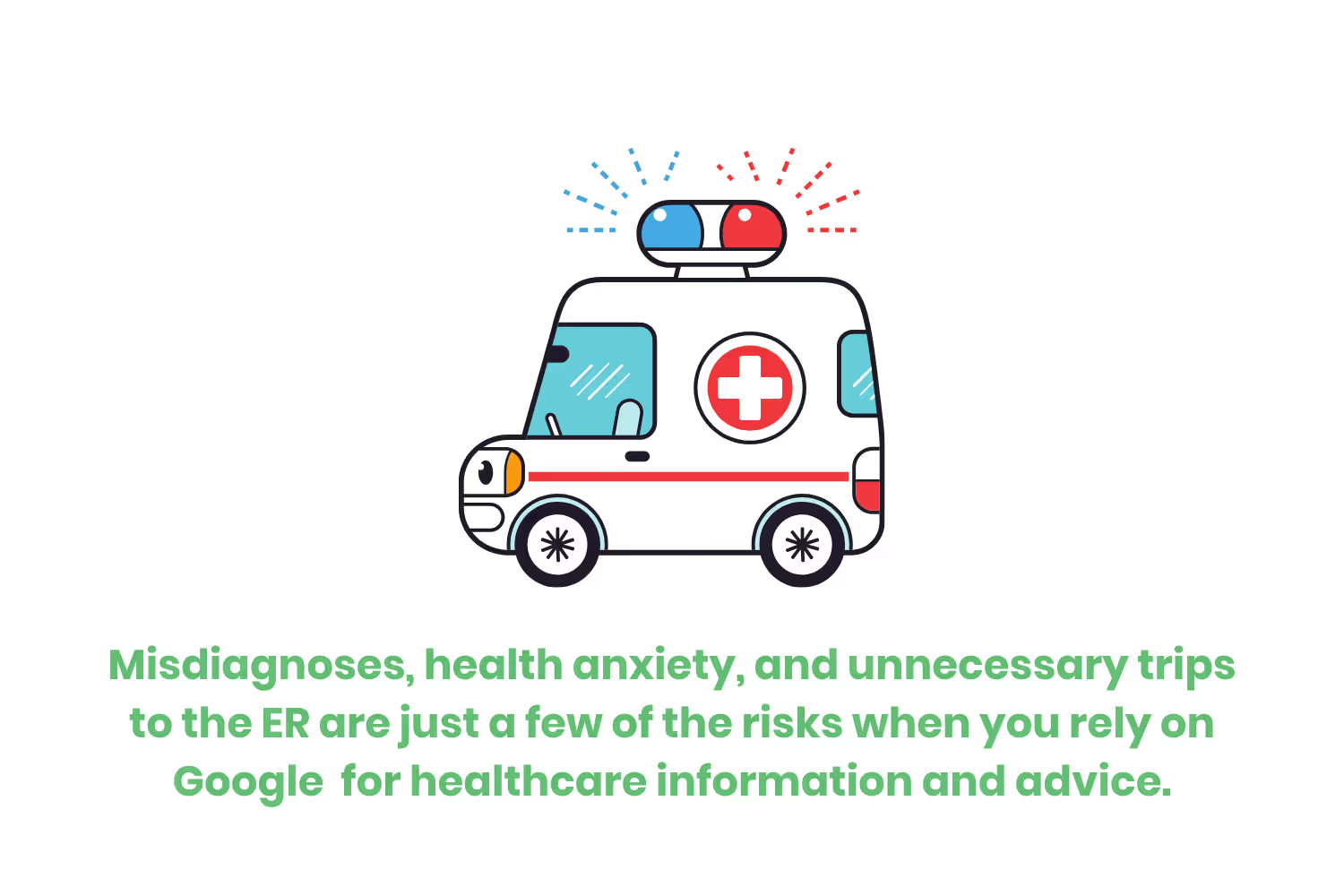
Avoid Googling Your Symptoms
Looking up health information isn’t always dangerous, because in some cases it can steer patients in the right direction. But the more research you do, the more likely you’ll land on a serious ailment.
This can cause unnecessary stress which does have harmful effects on health. People may also try taking matters into their own hands to remedy their possible disease. Or they become so convinced that they schedule unneeded visits and procedures.
Doctors want to avoid any unnecessary or invasive testing. But some patients are so adamant about having a disease that it’s the only way the doctor can convince them they’re fine.
On the other hand, people may avoid seeing a doctor because of their search results. Some will worry too much that they don’t want to schedule a visit and receive bad news. Or if Google will tell them it’s nothing to worry about, but it could be a bigger problem.
Ultimately, if you feel you need to look up your ailment because it’s unusual, you should stop Googling symptoms and then contact your doctor. A trained professional can diagnose you better than the internet or yourself.
To break the cycle of self-diagnosis, try the following steps:
- Don't Google your symptoms and consult a health professional instead.
- Look into cognitive behavioral therapy (CBT) if you are struggling with hypochondria or feeling anxious about health concerns.
- Try alternative ways to ease your anxiety other than searching for information online. Such as going for a walk.
- Remember, information available on web pages will likely not have a definitive answer to what's wrong with you.
Emphasize your product's unique features or benefits to differentiate it from competitors
In nec dictum adipiscing pharetra enim etiam scelerisque dolor purus ipsum egestas cursus vulputate arcu egestas ut eu sed mollis consectetur mattis pharetra curabitur et maecenas in mattis fames consectetur ipsum quis risus mauris aliquam ornare nisl purus at ipsum nulla accumsan consectetur vestibulum suspendisse aliquam condimentum scelerisque lacinia pellentesque vestibulum condimentum turpis ligula pharetra dictum sapien facilisis sapien at sagittis et cursus congue.
- Pharetra curabitur et maecenas in mattis fames consectetur ipsum quis risus.
- Justo urna nisi auctor consequat consectetur dolor lectus blandit.
- Eget egestas volutpat lacinia vestibulum vitae mattis hendrerit.
- Ornare elit odio tellus orci bibendum dictum id sem congue enim amet diam.
Incorporate statistics or specific numbers to highlight the effectiveness or popularity of your offering
Convallis pellentesque ullamcorper sapien sed tristique fermentum proin amet quam tincidunt feugiat vitae neque quisque odio ut pellentesque ac mauris eget lectus. Pretium arcu turpis lacus sapien sit at eu sapien duis magna nunc nibh nam non ut nibh ultrices ultrices elementum egestas enim nisl sed cursus pellentesque sit dignissim enim euismod sit et convallis sed pelis viverra quam at nisl sit pharetra enim nisl nec vestibulum posuere in volutpat sed blandit neque risus.

Use time-sensitive language to encourage immediate action, such as "Limited Time Offer
Feugiat vitae neque quisque odio ut pellentesque ac mauris eget lectus. Pretium arcu turpis lacus sapien sit at eu sapien duis magna nunc nibh nam non ut nibh ultrices ultrices elementum egestas enim nisl sed cursus pellentesque sit dignissim enim euismod sit et convallis sed pelis viverra quam at nisl sit pharetra enim nisl nec vestibulum posuere in volutpat sed blandit neque risus.
- Pharetra curabitur et maecenas in mattis fames consectetur ipsum quis risus.
- Justo urna nisi auctor consequat consectetur dolor lectus blandit.
- Eget egestas volutpat lacinia vestibulum vitae mattis hendrerit.
- Ornare elit odio tellus orci bibendum dictum id sem congue enim amet diam.
Address customer pain points directly by showing how your product solves their problems
Feugiat vitae neque quisque odio ut pellentesque ac mauris eget lectus. Pretium arcu turpis lacus sapien sit at eu sapien duis magna nunc nibh nam non ut nibh ultrices ultrices elementum egestas enim nisl sed cursus pellentesque sit dignissim enim euismod sit et convallis sed pelis viverra quam at nisl sit pharetra enim nisl nec vestibulum posuere in volutpat sed blandit neque risus.
Vel etiam vel amet aenean eget in habitasse nunc duis tellus sem turpis risus aliquam ac volutpat tellus eu faucibus ullamcorper.
Tailor titles to your ideal customer segment using phrases like "Designed for Busy Professionals
Sed pretium id nibh id sit felis vitae volutpat volutpat adipiscing at sodales neque lectus mi phasellus commodo at elit suspendisse ornare faucibus lectus purus viverra in nec aliquet commodo et sed sed nisi tempor mi pellentesque arcu viverra pretium duis enim vulputate dignissim etiam ultrices vitae neque urna proin nibh diam turpis augue lacus.


.avif)

